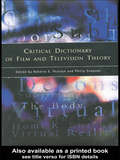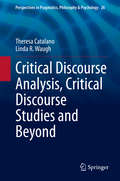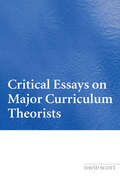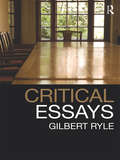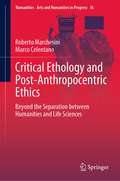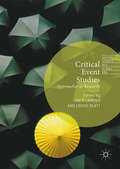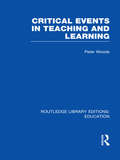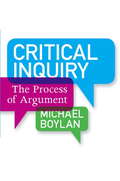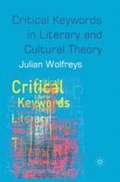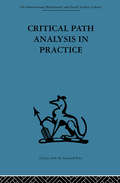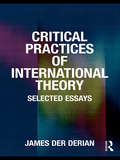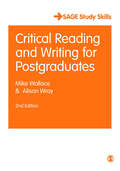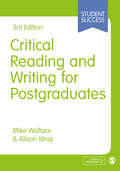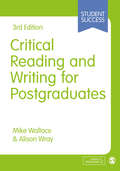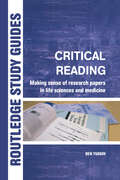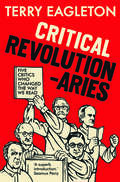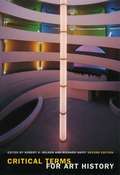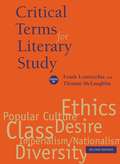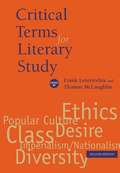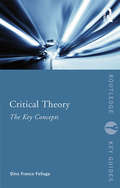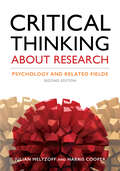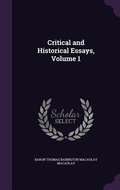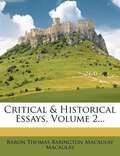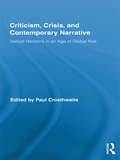- Table View
- List View
Critical Dictionary of Film and Television Theory
by Philip Simpson Roberta E. PearsonThe Critical Dictionary of Film and Television Theory clearly and accessibly explains the major theoretical approaches now deployed in the study of the moving image, as well as defining key theoretical terms.This dictionary provides readers with the conceptual apparatus to understand the often daunting language and terminology of screen studies. Entries include: *audience * Homi K. Bhabha * black cinema * the body * children and media * commodification * cop shows * deep focus * Umberto Eco * the gaze * Donna Haraway * bell hooks * infotainment * master narrative * medical dramas * morpheme * myth * panopticon * pastiche * pleasure * real time * social realism * sponsorship * sport on television * subliminal * third cinema * virtual realityConsultant Editors:David Black, USA, William Urricchio, University of Utrecht, The Netherlands, Gill Branston, Cardiff University, UK ,Elayne Rapping, USA
Critical Discourse Analysis, Critical Discourse Studies and Beyond (Perspectives in Pragmatics, Philosophy & Psychology #26)
by Linda R. Waugh Theresa CatalanoThis book explores the problem-oriented interdisciplinary research movement comprised of Critical Discourse Analysis (CDA) and Critical Discourse Studies (CDS) for scholars, teachers, and students from many backgrounds. Beginning with a Preface by renowned CDA/CDS scholar Ruth Wodak, it introduces CDA/CDS through examples of what its research looks like, delineates various precursors to CDA/CDS and important foundational concepts and theories, and traces its development from its early years until it became established. After the relationship between CDA and CDS is discussed, seven commonly cited approaches to CDA/CDS are outlined, including their connections and differences, their origins and development, major and associated scholars, research focus(es), and central concepts and distinguishing features. After a summary of critiques of CDA/CDS and responses by CDA/CDS scholars, the book provides an overview of its salient connections to other interdisciplinary areas of scholarship such as critical applied linguistics, education, anthropology/ ethnography, sociolinguistics, gender studies, queer linguistics, pragmatics and ecolinguistics. The final chapter describes how scholars use their knowledge of CDA/CDS to make a difference in the world.
Critical Essays on Major Curriculum Theorists
by David ScottThis book is a critical appreciation of the work of sixteen leading curriculum theorists, taking account of the writings of a balance of established thinkers and curriculum analysts from the fields of education, philosophy, sociology and psychology. Together these commentators offer a broad perspective with views from the UK, the US and Europe, and from a range of political stances ranging from radical conservatism through liberalism to socialism and libertarianism. The theorists include major names such as Lev Vygotsky, Jerome Bruner, Maxine Greene, Basil Bernstein, Micheal Foucault, Elliott Eisner, John White, Michael Apple and more. Ideal for students on all teacher training courses looking for an introduction to some of the key educational thinkers of our time, this key text can also be used as a companion volume to the Routledge four-volume set on curriculum theory.
Critical Essays: Collected Papers Volume 1
by Gilbert RyleGilbert Ryle was one of the most important and controversial philosophers of the Twentieth century. Long unavailable, Critical Essays: Collected Papers Volume 1 includes many of Ryle’s most important and thought-provoking papers. This volume contains 20 critical essays on the history of philosophy, with writing on Plato, Locke and Hume as well as important chapters on Russell and Wittgenstein. It also includes three essays on phenomenology, including Ryle’s famous review of Martin Heidegger’s Being and Time first published in 1928. Although Ryle believed phenomenology ‘will end in self-ruinous subjectivism or in a windy mysticism’ his review also acknowledged that Heidegger was a thinker of great originality and importance. While surveying the developments in the philosophy of language and philosophical logic, Ryle sets out his own conception of the philosophers’ role against that of his predecessors and contemporaries. Together with the second volume of Ryle’s collected papers Collected Papers Volume 2 and the new edition of The Concept of Mind, all published by Routledge, these outstanding essays represent the very best of Ryle’s work. Each volume contains a substantial introduction by Julia Tanney, and both are essential reading for any student of twentieth-century philosophies of mind and language. Gilbert Ryle (1900 -1976) was Waynflete Professor of Metaphysics and Fellow of Magdalen College Oxford, an editor of Mind, and a president of the Aristotelian Society. Julia Tanney is Senior Lecturer at the University of Kent, and has held visiting positions at the University of Picardie and Paris-Sorbonne.
Critical Ethology and Post-Anthropocentric Ethics: Beyond the Separation between Humanities and Life Sciences (Numanities - Arts and Humanities in Progress #16)
by Roberto Marchesini Marco CelentanoThe primary purpose of this book is to contribute to an overcoming of the traditional separation between humanties and life sciences which, according to the authors, is required today both by the developments of these disciplines and by the social problems they have to face. The volume discusses the theoretical, epistemological and ethical repercussions of the main acquisitions obtained in the last decades from the behavioral sciences. Both the authors are inspired by the concept of a “critical ethology”, oriented to archive the nature/culture and human/animal dichotomies. The book proposes a theoretical and methodological restructuring of the comparative study of the animal behavior, learning, and cultures, focused on the fact that thought, culture and language are not exclusively human prerogatives. The proposed analysis includes a critique of speciesism and determinism in the ethical field, and converge with the Numanities, to which the series is dedicated, on a key point: it is necessary to arrive at an education system able to offer scientific, social and ethical skills that are trasversal and transcendent to the traditional humanities/life sciences bipartition. Skills that are indispensable for facing the complex challenges of the contemporary society and promoting a critical reflection of humanity on itself.
Critical Event Studies: Approaches to Research (Leisure Studies in a Global Era)
by Ian R Lamond Louise PlattCritical Event Studies is a growing field, not justwithin event management and event studies, but across the traditional anddigital social sciences. This volume -with contributions from a range ofinternational scholars- is the first to consider the wide variety ofresearch approaches being used by academics from around the world, whoseinterests lie within the reach of this emerging field. Each chapter uses one ormore case examples to present and discuss different methodological approachesapplicable to research within critical event studies. Students and academicsalike will find inspiration and critical reflection on methodology that cansupport their own projects.
Critical Events in Teaching & Learning (Routledge Library Editions: Education)
by Peter WoodsThis volume describes and analyses exceptional educational events – periods of particularly effective teaching representing ultimates in teacher and pupil educational experience. The events themselves are reconstructed in the book through teacher and pupil voices and through documentation. A model of ‘critical event’ is derived from the study, which might serve as a possible framework for understanding other such occurrences in schools.
Critical Inquiry
by Michael BoylanIn this revised edition of The Process of Argument (1988), Boylan (philosophy, Marymount U. , Arlington, Virginia) illustrates how to employ inductive, deductive and other reasoning tools in pro and con arguments through numerous updated examples. The concise text includes exercises on critically reading and responding to media claims (including "phishing" e-mails), appended information on micro- and macro-arguments, and a glossary. Annotation ©2009 Book News, Inc. , Portland, OR (booknews. com)
Critical Inquiry
by Michael BoylanThis informative book is a necessary companion for anyone seeking to uncover the secret of successful persuasion: to organize, construct, and communicate arguments. It is at once comprehensive and accessible, an authoritative guide to logical thinking and effective communication. First, the text defines the nature and uses of argument, explaining how to read argument carefully. Such analysis then requires the student to reconstruct arguments in his or her own words. Finally, the reader is taught how to create a critical, reasoned response, thus constructing his or her own argument. To increase its accessibility and expand its range of application, Critical Inquiry uses (in addition to textual examples) advertisements from print media as "texts" for applying its principles to subjects outside the traditional mode of academic presentation. Throughout, carefully selected reading questions and exercises pace the reader and ensure that the material is securely grasped and successfully applied.
Critical Keywords in Literary and Cultural Theory
by Julian WolfreysThis book is an invaluable reference guide for students of literary and cultural studies which introduces over forty of the complex terms, motifs and concepts in literary and cultural theory today. Critical Keywords in Literary and Cultural Theory - gives students a brief introduction to each concept together with short quotations from the work of key thinkers and critics to stimulate discussion and guide genuine comprehension. - supplies helpful glosses and annotations for each term, concept or keyword which is discussed - offers reflective, practical questions at the end of each entry to direct the student to consider a particular aspect of the quotations and the concept they address - provides explanatory notes and bibliographies to aid further research This essential volume is ideal as both a dip-in reference book and a guide to literary theory for practical classroom use.
Critical Path Analysis in Practice: Collected papers on project control
by Gail ThornleyTavistock Press was established as a co-operative venture between the Tavistock Institute and Routledge & Kegan Paul (RKP) in the 1950s to produce a series of major contributions across the social sciences. This volume is part of a 2001 reissue of a selection of those important works which have since gone out of print, or are difficult to locate. Published by Routledge, 112 volumes in total are being brought together under the name The International Behavioural and Social Sciences Library: Classics from the Tavistock Press. Reproduced here in facsimile, this volume was originally published in 1968 and is available individually. The collection is also available in a number of themed mini-sets of between 5 and 13 volumes, or as a complete collection.
Critical Practices in International Theory: Selected Essays
by James Der DerianCritical Practices in International Theory brings together for the first time the essays of the leading IR theorist, James Der Derian. The essays cover a variety of issues central to Der Derian's work including diplomacy, alienation, terrorism, intelligence, national security, new forms of warfare, the role of information technology in international relations, poststructuralist theory, and the military-entertainment-media matrix. The book includes a framing introduction written for this volume in which Der Derian provides historical and theoretical context for a diverse body of work. Discussing his own influences and reflecting upon the development of international theory, he advocates a critical pluralist approach to the most pressing problems of world politics. Written in the eloquent style that marks out Der Derian as one of the most provocative and innovative thinkers in international relations, this collection is essential reading for scholars and students interested in the past, present and future of international relations. James Der Derian is a Watson Institute research professor of international studies at Brown University, where he directs the Global Security Program and the Global Media Project. He is the author of many articles and books, including the highly acclaimed Virtuous War (2001, 2009).
Critical Reading and Writing for Postgraduates
by Mike Wallace Alison Wray'A systematic, coherent approach to developing critical reading and writing skills that are applicable to a range of different levels of analysis and types of reading and writing tasks. The authors are to be commended for the clarity of their writing and the way scaffolded advice and tasks are integrated into the text. The book could form the core text for a course on critical reading and writing and a useful reference tool for the academic recently entered upon writing for publication. ' - Educate Journal 'A very clear, accessible introduction that will be invaluable to postgraduate students trying to engage with reading and writing in a critical way' - R. M. Lee, Professor of Social Research Methods, Royal Holloway University of London This guide to critical reading and self-critical writing is a 'must-have' resource for postgraduate students and early-career academics. Packed with tools for analysing texts and structuring critical reviews, and incorporating exercises and worked examples drawn from the social sciences, the book offers step-by-step advice on how to: " read any text critically and analyse it in the depth appropriate to one's project " develop a self-critical approach to one's own academic writing " ask questions in order to evaluate authors' arguments " keep a review manageable by using focused review questions " structure a comparative review of multiple texts " build up a convincing argument " integrate critical literature reviews into a dissertation or thesis " make the transition from postgraduate to professional academic writer Essential reading for novice researchers, the book will also be invaluable for supervisors, methods course tutors, and academic mentors who teach and support the development of critical reading and self-critical writing skills.
Critical Reading and Writing for Postgraduates (SAGE Study Skills Series)
by Professor Mike Wallace Professor Alison WrayLecturers, request your electronic inspection copy here Reading critically, and writing using critical techniques, are crucial skills you need to apply to your academic work. Practical and engaging, Critical Reading and Writing for Postgraduates is bursting with tools for analysing texts and structuring critical reviews, helping you to gradually build your skills beyond undergraduate level and gain confidence in your ability to critically read and write. New to this 3rd edition: Introduces a technique for developing critical thinking skills by interrogating paper abstracts Additional diagrams, exercises and concept explanations, enabling you to more easily understand and apply the various approaches A glossary, to help with understanding of key terms. Also new for this edition, a Companion Website provides additional resources to help you apply the critical techniques you learn. From templates and checklists, access to SAGE journal articles and additional case studies, these free resources will make sure you successfully master advanced critical skills. If you need to engage with published (or unpublished) literature such as essays, dissertations or theses, research papers or oral presentations, this proven guide helps you develop a reflective and advanced critical approach to your research and writing. SAGE Study Skills are essential study guides for students of all levels. From how to write great essays and succeeding at university, to writing your undergraduate dissertation and doing postgraduate research, SAGE Study Skills help you get the best from your time at university. Visit the SAGE Study Skills website for tips, resources and videos on study success!
Critical Reading and Writing for Postgraduates (SAGE Study Skills Series)
by Professor Mike Wallace Professor Alison WrayLecturers, request your electronic inspection copy here Reading critically, and writing using critical techniques, are crucial skills you need to apply to your academic work. Practical and engaging, Critical Reading and Writing for Postgraduates is bursting with tools for analysing texts and structuring critical reviews, helping you to gradually build your skills beyond undergraduate level and gain confidence in your ability to critically read and write. New to this 3rd edition: Introduces a technique for developing critical thinking skills by interrogating paper abstracts Additional diagrams, exercises and concept explanations, enabling you to more easily understand and apply the various approaches A glossary, to help with understanding of key terms. Also new for this edition, a Companion Website provides additional resources to help you apply the critical techniques you learn. From templates and checklists, access to SAGE journal articles and additional case studies, these free resources will make sure you successfully master advanced critical skills. If you need to engage with published (or unpublished) literature such as essays, dissertations or theses, research papers or oral presentations, this proven guide helps you develop a reflective and advanced critical approach to your research and writing. SAGE Study Skills are essential study guides for students of all levels. From how to write great essays and succeeding at university, to writing your undergraduate dissertation and doing postgraduate research, SAGE Study Skills help you get the best from your time at university. Visit the SAGE Study Skills website for tips, quizzes and videos on study success!
Critical Reading: Making Sense of Research Papers in Life Sciences and Medicine
by Ben YudkinTextbooks are designed to teach, explain and make complex information easily understood and assimilated. Research papers do the reader no such favours. Being able to understand and use primary research is an essential tool in any scientific career. This book teaches these valuable skills simply and clearly, saving hours in the long run. Critical Reading explains how to: approach every paper methodically spot work aimed to support a pet theory gain confidence in questioning what you read be alert to bias use abstracts intelligently identify suspect experimental methods assess quantitative methodology interpret results with confidence draw inferences from published work. Using extracts from published Papers in Focus, this book imparts valuable know-how to students and researchers from any biomedical or biological discipline. The text is easily read and understood and the use of key points, summaries and reference reinforces good technique.
Critical Revolutionaries: Five Critics Who Changed the Way We Read
by Terry EagletonTerry Eagleton looks back across sixty years to an extraordinary critical milieu that transformed the study of literature Before the First World War, traditional literary scholarship was isolated from society at large. In the years following, a younger generation of critics came to the fore. Their work represented a reaction to the impoverishment of language in a commercial, utilitarian society increasingly under the sway of film, advertising, and the popular press. For them, literary criticism was a way of diagnosing social ills and had a vital moral function to perform. Terry Eagleton reflects on the lives and work of T. S. Eliot, I. A. Richards, William Empson, F. R. Leavis, and Raymond Williams, and explores a vital tradition of literary criticism that today is in danger of being neglected. These five critics rank among the most original and influential of modern times, and represent one of the most remarkable intellectual formations in twentieth-century Britain. This was the heyday of literary modernism, a period of change and experimentation—the bravura of which spurred on developments in critical theory.
Critical Terms for Art History (2nd edition)
by Robert S. Nelson Richard Shiff"Art" has always been contested terrain, whether the object in question is a medieval tapestry or Duchamp's Fountain.
Critical Terms for Literary Study
by Lentricchia, Frank and McLaughlin, ThomasSince its publication in 1990, Critical Terms for Literary Study has become a landmark introduction to the work of literary theory—giving tens of thousands of students an unparalleled encounter with what it means to do theory and criticism. Significantly expanded, this new edition features six new chapters that confront, in different ways, the growing understanding of literary works as cultural practices. These six new chapters are "Popular Culture," "Diversity," "Imperialism/Nationalism," "Desire," "Ethics," and "Class," by John Fiske, Louis Menand, Seamus Deane, Judith Butler, Geoffrey Galt Harpham, and Daniel T. O'Hara, respectively. Each new essay adopts the approach that has won this book such widespread acclaim: each provides a concise history of a literary term, critically explores the issues and questions the term raises, and then puts theory into practice by showing the reading strategies the term permits. Exploring the concepts that shape the way we read, the essays combine to provide an extraordinary introduction to the work of literature and literary study, as the nation's most distinguished scholars put the tools of critical practice vividly to use.
Critical Terms for Literary Study (2nd edition)
by Frank Lentricchia Thomas MclaughlinAn expanded introduction to the work of literary theory covering the concepts that shape the way we read, with 28 essays written by a plethora of distinguished scholars.
Critical Theory: The Key Concepts (Routledge Key Guides)
by Dino Franco FellugaCritical Theory: The Key Concepts introduces over 300 widely-used terms, categories and ideas drawing upon well-established approaches like new historicism, postmodernism, psychoanalysis, Marxism, and narratology as well as many new critical theories of the last twenty years such as Actor-Network Theory, Global Studies, Critical Race Theory, and Speculative Realism. This book explains the key concepts at the heart of a wide range of influential theorists from Agamben to Žižek. Entries range from concise definitions to longer more explanatory essays and include terms such as: Aesthetics Desire Dissensus Dromocracy Hegemony Ideology Intersectionality Late Capitalism Performativity Race Suture Featuring cross-referencing throughout, a substantial bibliography and index, Critical Theory: The Key Concepts is an accessible and easy-to-use guide. This book is an invaluable introduction covering a wide range of subjects for anyone who is studying or has an interest in critical theory (past and present).
Critical Thinking About Research: Psychology and Related Fields
by Dr. Harris Cooper Julian Meltzoff PhDTo become informed consumers of research, students need to thoughtfully evaluate the research they read rather than accept it without question. This second edition of a classic text gives students what they need to apply critical reasoning when reading behavioral science research. This second edition updates the original text with recent developments in research methods, including a new chapter on meta-analyses. Part I gives a thorough overview of the steps in a research project. It focuses on how to assess whether the conclusions drawn in a behavioral science report are warranted by the methods used in the research. Topics include research hypotheses, sampling, experimental design, data analysis, interpretation of results, and ethics. Part II allows readers to practice critical thinking with a series of fictitious journal articles containing built-in flaws in method and interpretation. Clever and engaging, each article is accompanied by a commentary that points out the errors of procedure and logic that have been deliberately embedded in the article. This combination of instruction and practical application will promote active learning and critical thinking in students studying the behavioral sciences.
Critical and Historical Essays -- Volume 1
by Baron Thomas Babington Macaulay MacaulayCritical and Historical Essays: Contributed to the Edinburgh Review (1843) is a collection of articles by Thomas Babington Macaulay, later Lord Macaulay. They have been acclaimed for their readability, but criticized for their inflexible attachment to the attitudes of the Whig school of history.
Critical and Historical Essays -- Volume 2
by Baron Thomas Babington Macaulay MacaulayEssays by Macaulay in the Edinburgh Review published between 1832 and 1839 on Horace Walpole, the War of Spanish Succession, William Pitt, Sir James Mackintosh, Lord Bacon, and Gladstone.
Criticism, Crisis, and Contemporary Narrative: Textual Horizons in an Age of Global Risk (Routledge Studies in Contemporary Literature)
by Paul CrosthwaiteThe etymological affinity between ‘criticism’ and ‘crisis’ has never been more resonant than it is today, when social life is increasingly understood as defined by a succession of overlapping global crises: financial and economic crises; environmental crises; geopolitical crises; terrorist crises; public health crises. But what is the role of literary and cultural criticism in conceptualizing this atmosphere of perpetual crisis? If, as Paul de Man maintained, criticism necessarily exists in a state of crisis, in what ways is this condition intensified at a time when the social formations within which criticism operates and the cultural artefacts that it takes as its objects are themselves pervaded by actual and imagined states of emergency? This book, the first sustained response to these questions, demonstrates the capacity of critical thought, working in dialogue with key narrative texts, to provide penetrating insights into a contemporary landscape of global, manufactured risk. Written by an international team of specialist scholars, the essays in the collection draw on a wide variety of contemporary theoretical, fictional, and cinematic sources, ranging from Giorgio Agamben, Jacques Derrida, and Fredric Jameson to Cormac McCarthy, Ian McEwan, and Lauren Beukes to Ghost and the James Bond and National Treasure series. Appearing in the midst of a phase of extraordinary turbulence in the fabric of our interconnected and interdependent world, the book makes a landmark intervention in debates concerning the cultural ramifications of globalization.
